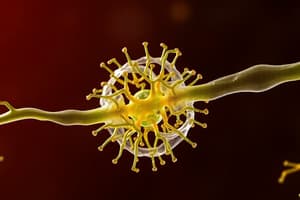Podcast
Questions and Answers
What is the role of telomeres in cell ageing?
What is the role of telomeres in cell ageing?
Loss of telomere sections leads to cell division cessation.
Differentiate between apoptosis and necrosis in terms of cell death mechanisms.
Differentiate between apoptosis and necrosis in terms of cell death mechanisms.
Apoptosis is programmed cell death involving 'suicide genes' and DNA fragmentation, while necrosis is cell injury leading to cellular content release and inflammatory response.
Explain the process of gene activation and its importance in initiating protein synthesis.
Explain the process of gene activation and its importance in initiating protein synthesis.
Activation of genes requires DNA uncoiling for transcription to occur, essential for initiating protein synthesis.
Describe the steps involved in protein synthesis, highlighting the role of organelles and RNA types.
Describe the steps involved in protein synthesis, highlighting the role of organelles and RNA types.
Explain the difference between benign and malignant tumors, and discuss the concept of metastases.
Explain the difference between benign and malignant tumors, and discuss the concept of metastases.
Differentiate between transcription and translation, including their locations and processes.
Differentiate between transcription and translation, including their locations and processes.
Explain the role of organelles like the nucleus, rough endoplasmic reticulum (RER), ribosomes, and Golgi apparatus in protein synthesis.
Explain the role of organelles like the nucleus, rough endoplasmic reticulum (RER), ribosomes, and Golgi apparatus in protein synthesis.
Differentiate between the types of RNA involved in protein synthesis: messenger RNA (mRNA), transfer RNA (tRNA), and ribosomal RNA (rRNA).
Differentiate between the types of RNA involved in protein synthesis: messenger RNA (mRNA), transfer RNA (tRNA), and ribosomal RNA (rRNA).
Explain the process of gene activation and the importance of DNA uncoiling for transcription to occur.
Explain the process of gene activation and the importance of DNA uncoiling for transcription to occur.
Describe the difference between transcription (DNA to mRNA) in the nucleus and translation (mRNA to protein) at ribosomes in the cytoplasm.
Describe the difference between transcription (DNA to mRNA) in the nucleus and translation (mRNA to protein) at ribosomes in the cytoplasm.
Explain the process of cell differentiation and how it leads to cellular specialization for specific functions.
Explain the process of cell differentiation and how it leads to cellular specialization for specific functions.
Describe the stages of mitosis (prophase, metaphase, anaphase, telophase, and cytokinesis) and their significance in cell division.
Describe the stages of mitosis (prophase, metaphase, anaphase, telophase, and cytokinesis) and their significance in cell division.
Explain the process of cell differentiation and how cells become specialized for specific physiological functions.
Explain the process of cell differentiation and how cells become specialized for specific physiological functions.
Describe the relationship between cell division and cancer.
Describe the relationship between cell division and cancer.
Explain the process of transcription and its role in protein synthesis.
Explain the process of transcription and its role in protein synthesis.
Describe the process of gene activation and its importance in cellular functions.
Describe the process of gene activation and its importance in cellular functions.
Discuss the stages of the cell cycle, with a focus on the events that occur during mitosis.
Discuss the stages of the cell cycle, with a focus on the events that occur during mitosis.
Explain the concept of a triplet code in relation to the genetic code and protein synthesis.
Explain the concept of a triplet code in relation to the genetic code and protein synthesis.
Flashcards are hidden until you start studying




